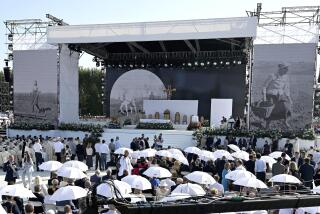At Hill of Faith, Pope Mourns Victims of Tyranny
- Share via
VILNIUS, Lithuania — Speaking from a hill of crosses that became a historic statement of faith and a symbol of resistance in Lithuania, Pope John Paul II on Tuesday mourned the victims of Communist tyranny and begged their heirs to overcome Europe’s legacy of hatreds.
Midway through his weeklong first visit to the former Soviet Union, John Paul flew to the northern city of Siauliai to visit a nearby hillock, under a solitary fir tree, where Lithuanians have affixed thousands of wood and metal crosses. Under communism, they had repeatedly defied attempts by the government to end the practice.
“We come here to remember all the sons and daughters of your land, as well as those sentenced, those sent to prison, to concentration camps, deported to Siberia or Kolyma and condemned to death,” the Pope said, individually saluting three Lithuanian bishops persecuted by Soviet authorities.
“Innocents were condemned. At that time in your homeland a terrible system marked by totalitarian violence raged, a system which trampled down and humiliated man,” John Paul recalled.
About 36,000 Lithuanian nationalists, among them politicians, intellectuals and churchmen, were deported to camps in the Siberian gulag, including the Kolyma region, after the Stalinist annexation of their country in 1940.
The 73-year-old Polish pontiff spoke at a Mass that drew about 50,000 worshipers to the wind-whipped hillside where, Lithuanians believe, crosses first began appearing in the 15th Century.
In more recent times, crosses on a mound about 300 feet by 50 feet have protested czarist and Communist rule. Soviet officials, who once swamped the hillock with sewage, uprooted thousands of the crosses, only to have more sprout by night in their place. The number has grown dramatically since the recovery of Lithuanian independence in 1991, local church officials say.
If their faith helped them to overcome communism, the Pope told worshipers in the most Catholic of the Baltic states, now it should allow them to lay aside political and ethnic hatreds.
“Love surpasses deadly hate, which has violently spread to our European Continent also. It is the love with which God loved the world in Christ crucified and risen,” John Paul said.
Later, the Pope stopped briefly at a shrine to the Virgin Mary to applaud the return of independence to a people “who have suffered long years of humiliating oppression, robbed of their national identity and restrained by the straitjacket of an inhuman ideology. At last the outward peace of a stifling regime is being followed by the peace of a free, ordered life in common that respects all individuals and their rights.”
But, the Pope urged Lithuanians, make the peace deep and lasting by anchoring it in moral conviction:
“The experience of longstanding democratic societies warns us of the dangers of an ambiguous peace, one based on minimalism or moral relativism,” John Paul said.
John Paul, who arrived in Lithuania on Saturday, leaves this morning for a two-day visit to neighboring Latvia. He will pause in Estonia, the third of the newly independent Baltic states, on Friday on his way back to Rome.
More to Read
Sign up for Essential California
The most important California stories and recommendations in your inbox every morning.
You may occasionally receive promotional content from the Los Angeles Times.













